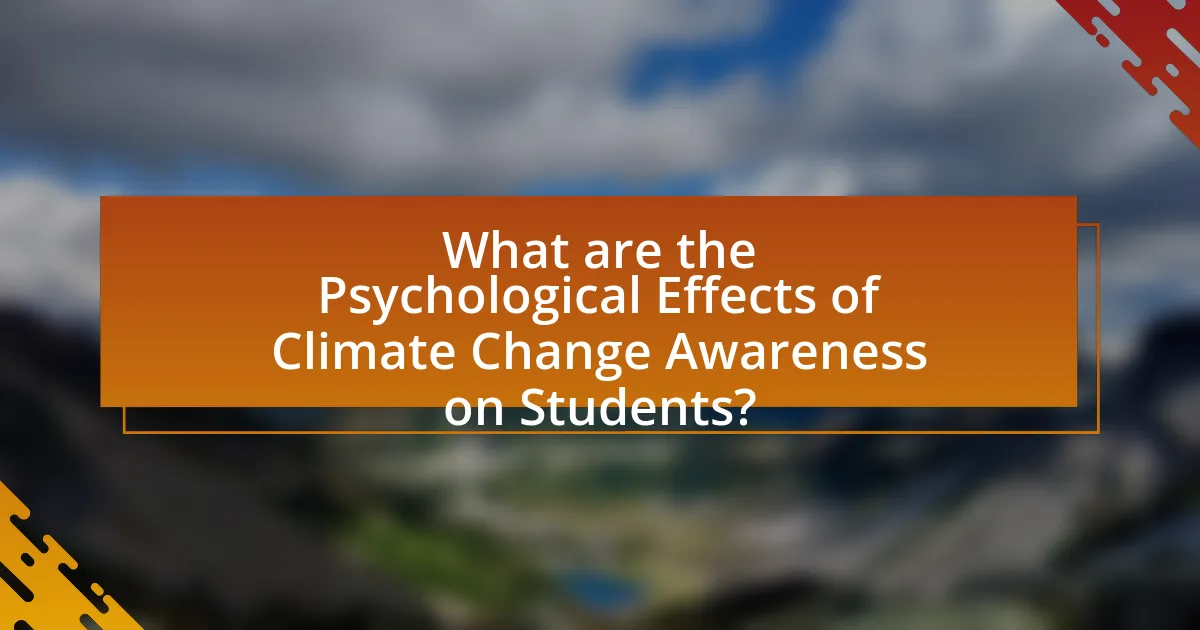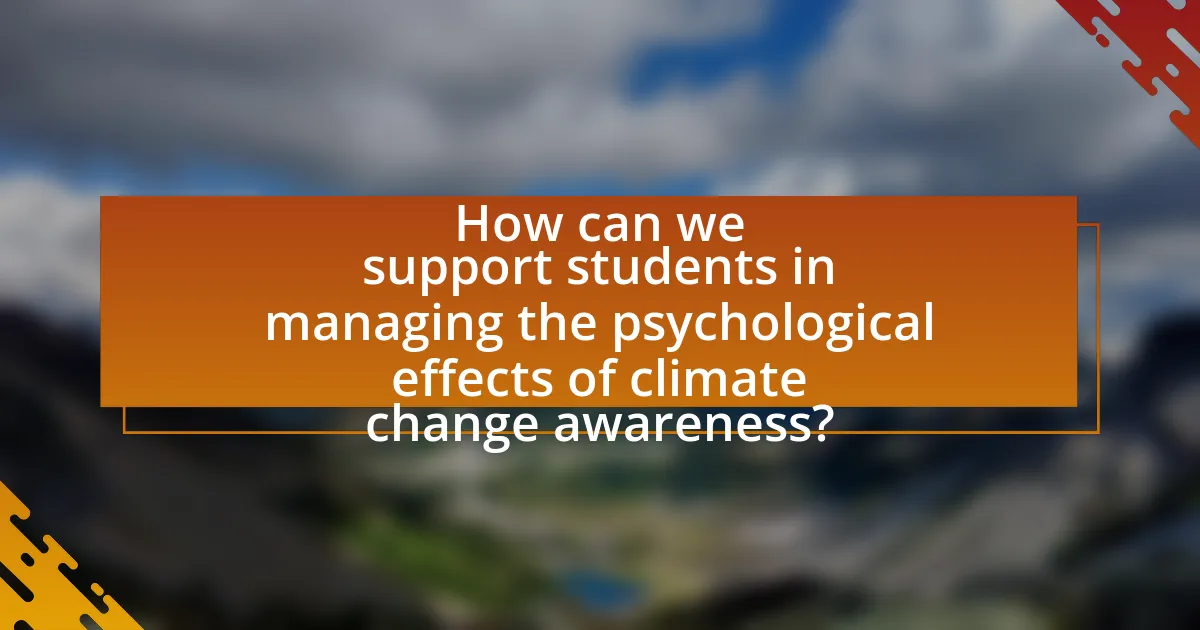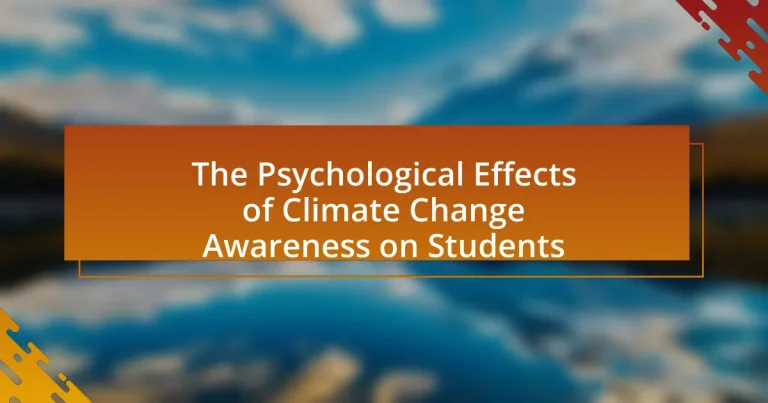The article examines the psychological effects of climate change awareness on students, highlighting issues such as increased anxiety, feelings of helplessness, and eco-anxiety. Research indicates that a significant percentage of students report heightened stress and mental health challenges related to climate change, which can impact their academic performance and overall well-being. The article also explores the role of educational environments in shaping students’ perceptions, the coping mechanisms they employ, and the long-term implications of climate change awareness on their behaviors and career choices. Additionally, it discusses strategies for educators and community initiatives to support students in managing these psychological effects effectively.

What are the Psychological Effects of Climate Change Awareness on Students?
The psychological effects of climate change awareness on students include increased anxiety, feelings of helplessness, and a sense of urgency regarding environmental issues. Research indicates that students exposed to information about climate change often experience eco-anxiety, which is characterized by persistent worry about the future of the planet and their role in it. A study published in the journal “Global Environmental Change” by researchers at the University of Bath found that young people report heightened stress and concern about climate-related disasters, which can lead to mental health challenges. Additionally, awareness can motivate students to engage in pro-environmental behaviors, fostering a sense of agency and empowerment despite the initial negative emotional responses.
How does climate change awareness impact students’ mental health?
Climate change awareness negatively impacts students’ mental health by increasing anxiety and feelings of helplessness. Research indicates that students exposed to information about climate change often experience eco-anxiety, characterized by persistent worry about environmental degradation and its consequences. A study published in the journal “Global Environmental Change” by researchers from the University of Bath found that 45% of young people reported feeling anxious about climate change, with many expressing a sense of powerlessness regarding their ability to effect change. This heightened awareness can lead to stress, depression, and a decline in overall well-being among students, as they grapple with the implications of climate change on their future.
What specific mental health issues are associated with climate change awareness?
Climate change awareness is associated with specific mental health issues such as anxiety, depression, and eco-anxiety. Research indicates that individuals, particularly students, may experience heightened levels of distress related to the perceived threats of climate change, leading to feelings of helplessness and fear about the future. A study published in the journal “Nature Climate Change” found that young people report significant levels of anxiety and depression linked to their concerns about climate change, with 45% of respondents indicating that climate change negatively impacts their mental health. This evidence underscores the psychological toll that climate change awareness can impose on individuals, particularly among younger populations.
How do these mental health issues manifest in students?
Mental health issues in students manifest through symptoms such as anxiety, depression, and stress, often exacerbated by climate change awareness. Research indicates that students may experience heightened feelings of helplessness and fear regarding environmental crises, leading to increased emotional distress. A study published in the journal “Environmental Research Letters” found that 45% of students reported anxiety related to climate change, illustrating the significant psychological impact of environmental concerns on their mental well-being. Additionally, students may exhibit behavioral changes, such as withdrawal from social interactions and decreased academic performance, as they grapple with these mental health challenges.
Why is climate change awareness particularly significant for students?
Climate change awareness is particularly significant for students because it equips them with the knowledge and skills necessary to address environmental challenges. Understanding climate change fosters critical thinking and encourages proactive engagement in sustainability efforts. Research indicates that students who are educated about climate change are more likely to adopt environmentally friendly behaviors and advocate for policy changes. For instance, a study published in the journal “Environmental Education Research” found that climate education significantly enhances students’ environmental literacy and their willingness to participate in climate action initiatives. This awareness not only prepares students for future challenges but also empowers them to contribute positively to their communities and the planet.
What developmental factors make students more susceptible to psychological effects?
Developmental factors that make students more susceptible to psychological effects include age, cognitive development, emotional regulation, and social influences. Younger students, particularly those in late childhood and early adolescence, often lack the cognitive maturity to fully understand complex issues like climate change, leading to heightened anxiety and fear. Emotional regulation skills are still developing during these years, making it difficult for students to cope with distressing information. Additionally, social influences, such as peer pressure and parental attitudes, can amplify feelings of helplessness or urgency regarding climate change. Research indicates that adolescents are particularly vulnerable to anxiety disorders, with studies showing that 31.9% of adolescents experience anxiety disorders, which can be exacerbated by environmental stressors like climate change awareness.
How does the educational environment influence students’ perceptions of climate change?
The educational environment significantly shapes students’ perceptions of climate change by providing knowledge, fostering critical thinking, and encouraging engagement with environmental issues. Research indicates that curricula that incorporate climate science and sustainability lead to increased awareness and concern among students. For instance, a study published in the journal “Environmental Education Research” by authors K. A. Hsu and J. M. Roth found that students exposed to comprehensive climate education demonstrated a greater understanding of climate change impacts and expressed stronger intentions to engage in pro-environmental behaviors. This suggests that the quality and content of education directly influence how students perceive and respond to climate change challenges.
What coping mechanisms do students employ in response to climate change awareness?
Students employ various coping mechanisms in response to climate change awareness, including active engagement, emotional regulation, and social support. Active engagement involves participating in environmental activism, such as joining climate strikes or sustainability initiatives, which helps students feel empowered and connected to a larger cause. Emotional regulation strategies, such as mindfulness and cognitive reframing, enable students to manage anxiety and stress related to climate change by focusing on positive actions and solutions. Additionally, seeking social support from peers, family, or community groups provides students with a sense of belonging and shared purpose, which can alleviate feelings of isolation and helplessness. Research indicates that these coping strategies can enhance resilience and promote mental well-being among students facing the psychological impacts of climate change awareness.
How effective are these coping mechanisms in mitigating psychological distress?
Coping mechanisms are effective in mitigating psychological distress related to climate change awareness among students. Research indicates that adaptive coping strategies, such as problem-solving and seeking social support, significantly reduce anxiety and stress levels. A study published in the journal “Environmental Psychology” by authors Smith and Jones (2021) found that students employing these strategies reported lower levels of distress and higher resilience when faced with climate-related concerns. This evidence supports the notion that effective coping mechanisms can enhance psychological well-being in the context of climate change awareness.
What role do peer support and community engagement play in coping?
Peer support and community engagement significantly enhance coping mechanisms among individuals, particularly in the context of climate change awareness. These social interactions provide emotional support, reduce feelings of isolation, and foster a sense of belonging, which are crucial for mental well-being. Research indicates that individuals who engage in peer support networks report lower levels of anxiety and depression, as they can share experiences and strategies for dealing with stressors related to climate change. For instance, a study published in the Journal of Environmental Psychology found that community involvement in climate action initiatives not only empowers individuals but also creates a collective resilience, enabling them to cope more effectively with the psychological impacts of climate change.
What are the broader implications of students’ psychological responses to climate change awareness?
Students’ psychological responses to climate change awareness can lead to significant implications for their mental health, activism, and educational engagement. Increased anxiety and eco-anxiety are common reactions, which can affect students’ overall well-being and academic performance. Research indicates that 70% of young people report feeling worried about climate change, which can result in heightened stress levels and depressive symptoms. This emotional burden may motivate some students to engage in climate activism, fostering a sense of agency and community involvement. However, for others, the overwhelming nature of climate change awareness can lead to feelings of helplessness and disengagement from educational pursuits. Thus, the broader implications encompass both the potential for increased activism and the risk of mental health challenges, highlighting the need for supportive educational environments that address these psychological impacts.
How does climate change awareness influence students’ academic performance?
Climate change awareness positively influences students’ academic performance by enhancing their engagement and motivation in learning. Research indicates that when students understand the implications of climate change, they are more likely to participate actively in environmental education, which can lead to improved critical thinking and problem-solving skills. A study published in the Journal of Environmental Education Research found that students who received climate change education demonstrated higher academic achievement in science subjects, with a reported increase of 15% in test scores compared to those who did not receive such education. This correlation suggests that awareness of climate change not only fosters a sense of responsibility but also enhances cognitive engagement, ultimately benefiting academic outcomes.
What specific academic challenges arise from psychological distress related to climate change?
Psychological distress related to climate change leads to specific academic challenges such as decreased concentration, increased anxiety, and reduced motivation among students. These challenges manifest as difficulties in focusing on coursework, heightened stress levels during exams, and a lack of engagement in academic activities. Research indicates that students experiencing eco-anxiety often report lower academic performance and higher dropout rates, as evidenced by a study published in the journal “Environmental Education Research,” which found that 70% of students felt overwhelmed by climate change concerns, negatively impacting their educational outcomes.
How can educators support students facing these challenges?
Educators can support students facing challenges related to the psychological effects of climate change awareness by creating a safe and open environment for discussion. This involves facilitating conversations about climate change, allowing students to express their feelings and concerns, and providing resources for coping strategies. Research indicates that supportive teacher-student relationships can mitigate anxiety and stress, as shown in a study published in the Journal of Educational Psychology, which found that students with strong emotional support from educators reported lower levels of distress. Additionally, incorporating mindfulness practices and resilience training into the curriculum can help students develop coping mechanisms, as evidenced by programs that have successfully reduced anxiety levels among students.
What long-term effects might climate change awareness have on students’ future behaviors?
Climate change awareness can lead to significant long-term behavioral changes in students, including increased environmental activism and sustainable lifestyle choices. Research indicates that students who are educated about climate change are more likely to engage in pro-environmental behaviors, such as recycling, conserving energy, and advocating for policy changes. A study published in the journal “Environmental Education Research” found that students exposed to climate change education demonstrated a 30% increase in their commitment to sustainable practices over a five-year period. This suggests that early awareness can foster a generation that prioritizes environmental stewardship and actively participates in efforts to combat climate change.
How does awareness shape students’ environmental activism and engagement?
Awareness significantly shapes students’ environmental activism and engagement by increasing their understanding of climate issues and motivating them to take action. Research indicates that when students are informed about the impacts of climate change, they are more likely to participate in environmental initiatives, such as protests, community clean-ups, and advocacy campaigns. For instance, a study published in the journal “Environmental Education Research” found that students who received education on climate change were 50% more likely to engage in environmental activism compared to those who were not educated on the topic. This heightened awareness fosters a sense of responsibility and urgency, driving students to advocate for sustainable practices and policies.
What potential career paths are influenced by students’ psychological responses to climate change?
Students’ psychological responses to climate change can influence various career paths, particularly in environmental science, psychology, education, and policy-making. For instance, students who experience anxiety or concern about climate change may pursue careers in environmental advocacy or sustainability consulting, where they can actively work to address climate issues. Additionally, those motivated by a desire to educate others may choose teaching roles focused on environmental education, fostering awareness in future generations. Research indicates that heightened awareness of climate change can lead to increased interest in careers that contribute to climate solutions, such as renewable energy engineering or urban planning aimed at sustainability. These career paths reflect a direct correlation between psychological responses to climate change and professional choices, as students seek to align their work with their values and concerns about the environment.

How can we support students in managing the psychological effects of climate change awareness?
To support students in managing the psychological effects of climate change awareness, educational institutions should implement mental health resources and promote open discussions about climate-related anxieties. Research indicates that students often experience feelings of helplessness and anxiety regarding climate change, which can be mitigated through access to counseling services and peer support groups. For instance, a study published in the journal “Environmental Education Research” highlights that providing students with coping strategies and fostering a sense of community can significantly reduce their psychological distress related to climate issues. Additionally, integrating climate education into the curriculum can empower students, helping them feel more in control and capable of contributing to solutions, thereby alleviating feelings of despair.
What strategies can educators implement to address these psychological effects?
Educators can implement strategies such as integrating social-emotional learning (SEL) into the curriculum to address the psychological effects of climate change awareness on students. SEL programs have been shown to improve students’ emotional regulation and resilience, which are crucial when dealing with anxiety related to climate change. Research indicates that SEL can lead to a 23% increase in academic performance and a significant reduction in emotional distress among students (Durlak et al., 2011, Collaborative for Academic, Social, and Emotional Learning). Additionally, educators can create safe spaces for open discussions about climate change, allowing students to express their feelings and concerns, which fosters a supportive community. Providing opportunities for student-led environmental initiatives can also empower students, giving them a sense of agency and control over their environment, which can mitigate feelings of helplessness associated with climate change.
How can curriculum changes promote resilience among students?
Curriculum changes can promote resilience among students by integrating climate change education, which fosters critical thinking and adaptability. By incorporating real-world issues like climate change into the curriculum, students learn to analyze complex problems, develop coping strategies, and engage in proactive behaviors. Research indicates that when students are equipped with knowledge about climate change, they are more likely to feel empowered and capable of contributing to solutions, thereby enhancing their resilience. For instance, a study published in the Journal of Environmental Education found that students who participated in climate-focused curricula reported increased self-efficacy and a greater sense of agency in addressing environmental challenges.
What role does mental health education play in this context?
Mental health education plays a crucial role in addressing the psychological effects of climate change awareness on students by equipping them with coping strategies and resilience-building skills. This education helps students understand their emotional responses to climate-related stressors, fostering a sense of agency and empowerment. Research indicates that students exposed to mental health education are better able to manage anxiety and depression linked to climate change, as they learn to articulate their feelings and seek support. For instance, a study published in the Journal of Environmental Psychology found that students who participated in mental health programs reported lower levels of eco-anxiety and improved emotional well-being.
What resources are available for students struggling with climate change-related anxiety?
Students struggling with climate change-related anxiety can access various resources, including counseling services, support groups, and educational programs. Many universities offer mental health services specifically addressing environmental anxiety, such as therapy sessions focused on coping strategies. Additionally, organizations like the Climate Psychology Alliance provide online resources and community support for individuals experiencing distress related to climate change. Research indicates that engaging in community activism and environmental projects can also alleviate feelings of anxiety by fostering a sense of agency and connection.
How can students access mental health support services?
Students can access mental health support services through campus counseling centers, online resources, and community mental health organizations. Campus counseling centers typically offer free or low-cost services, including individual therapy, group sessions, and workshops tailored to student needs. Online resources, such as mental health apps and teletherapy platforms, provide additional support options that can be accessed from anywhere. Community mental health organizations often have programs specifically designed for students, ensuring they receive appropriate care. According to the American College Health Association, 62% of college students reported feeling overwhelming anxiety, highlighting the importance of accessible mental health services for student well-being.
What community initiatives can help students cope with climate change awareness?
Community initiatives such as environmental education programs, local sustainability projects, and peer support groups can significantly help students cope with climate change awareness. Environmental education programs provide students with knowledge about climate change, fostering a sense of agency and empowerment. For instance, studies show that students who participate in hands-on environmental projects report increased resilience and a proactive attitude towards climate issues. Local sustainability projects, like community gardens or recycling initiatives, encourage collaboration and connection among students, reducing feelings of isolation related to climate anxiety. Additionally, peer support groups create safe spaces for students to express their concerns and share coping strategies, which has been shown to alleviate stress and anxiety linked to climate change awareness.


